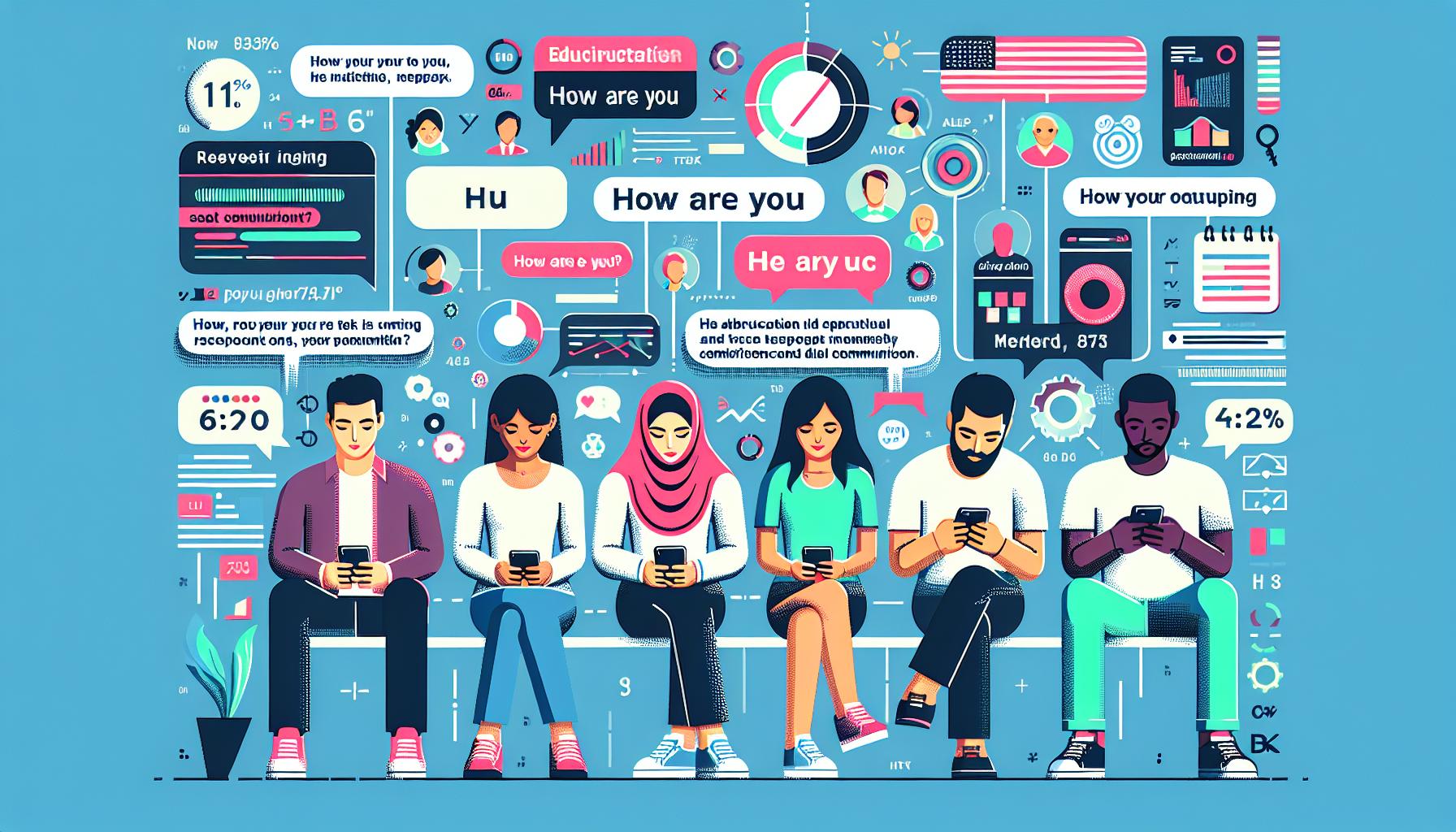So, you’re texting away, having a grand old time, when suddenly, you receive a message that says “hru.” Huh? What on earth does that mean? Is it some secret code? A new language? Well, fear not, my friend, because I’m here to unravel the mystery of “hru” for you.
I’m no detective, but I’ve done some extensive research (okay, I Googled it) and it turns out that “hru” is actually an abbreviation for “how are you?” It’s like a secret handshake among texters, a way of asking someone about their well-being without typing out the whole sentence. Sneaky, huh? But hey, we all love a little shortcut from time to time.
What does “hru” mean in text?
Understanding the abbreviation “hru”
So, you’re texting away, minding your own business, when suddenly you receive a message that says “hru”. Now, if you’re new to the wonderful world of texting, you might be scratching your head thinking, “What the heck does ‘hru’ mean?” Well, fear not, my friend, for I am here to enlighten you!
“Hru” is actually an abbreviation for “how are you?”. It’s the lazy texter’s way of asking about your well-being without having to type out the whole sentence. I mean, who has time for that, am I right? But don’t worry, it’s not just a jumble of letters thrown together randomly. It’s like a secret handshake among texters, a hidden code that we all understand.
Common usage of “hru”
Now that you know what “hru” means, let’s talk about how it’s commonly used in text messages. You might see it written in all caps with a question mark, like “HRU?”, or it can be more casually written as “hru”. It really just depends on how the person prefers to write it.
But here’s the thing about “hru” – it’s not just a question, it’s also a conversation starter. When someone asks you “hru?”, they’re not just asking for a simple “I’m fine” response. They want to know how you’re really doing. It’s an invitation to open up and share your thoughts and feelings. So, if someone asks you “hru?”, don’t be afraid to dive deep and give them an honest answer.
The origin of “hru”

The Evolution of Text Language
Oh, let me take you on a journey through time, back to the prehistoric era of text messaging. It was a magical time when we had to painstakingly type out every.single.word. No shortcuts, just pure finger acrobatics.
But then, like a gift from the texting gods, abbreviations started popping up. Those little time-saving gems that made texting a breeze. And in the midst of this abbreviation frenzy, “hru” was born.
Early Usage of “hru”
Picture this: it’s the early days of text messaging, and people are just starting to dive into the world of abbreviations. And then, out of nowhere, someone comes up with the brilliant idea to condense “how are you?” into those magical three letters: “hru.”
Suddenly, texters everywhere rejoiced. No longer did they have to type out the entire question. “hru” became the secret code, the secret handshake of the texting world. It was the perfect way to ask about someone’s well-being without breaking a sweat.
But here’s the thing, my friends. “hru” is not just a question. It’s an invitation, a conversation starter. It’s like sending a little message saying, “Hey, I care about you. How’s life treating you?” It’s a beautiful thing, really.
So, whether you choose to type “hru” in all caps with a question mark or go for a more casual “hru,” just know that you’re part of a grand tradition. A tradition that celebrates efficiency and camaraderie in the world of texting.
And there you have it, the fascinating origin story of “hru.” We’ve come a long way from typing out every word, haven’t we? So next time you receive that three-letter question, take a moment to appreciate the magic that is “hru.”
“Hru” vs other abbreviations
Differences between “hru” and “how are you”
When it comes to abbreviations used in text messages, “hru” stands out in its simplicity. But how does it compare to the good old phrase “how are you?” Let’s break it down:
- Length: “Hru” is a three-letter abbreviation, while “how are you” is a six-word phrase. Talk about efficiency!
- Informality: “Hru” has a more casual vibe, suitable for friendly conversations. On the other hand, “how are you” is a bit more formal. So, depending on the context, you can choose the abbreviation that suits your style.
Comparing “hru” with similar abbreviations
“Hru” may be short and sweet, but it’s not the only abbreviation in town. Here are a few others that aim to replace the infamous question, “how are you?”
- “Wassup”: This popular alternative takes it a step further and condenses “what’s up” into a single word. It’s perfect for those who prefer a more laid-back approach to checking in with friends.
- “Sup”: If you’re looking for something even shorter, “sup” has got your back. It ditches the unnecessary letters and gets straight to the point.
Sure, these abbreviations might not have the same depth and warmth as a full sentence, but in the fast-paced world of text messages, sometimes brevity is just what we need.
The social impact of “hru”
The role of “hru” in communication
Ah, the infamous “hru.” It may sound like a secret code to the uninitiated, but in the world of text messaging, it’s a shortcut for asking “how are you?” You see, in our fast-paced digital age, brevity is key. Who has time to type out the full phrase when you can save valuable seconds with a simple three-letter abbreviation?
Some might argue that using “hru” lacks the personal touch that a full sentence brings. But let me tell you, my friends, “hru” has carved its own little niche in the world of communication. It’s like the swiss army knife of text abbreviations – versatile, efficient, and always ready to do the job.
I mean, just think about it. You’re chatting away with a friend, and suddenly a wild “hru?” appears. Boom! It’s like a virtual check-in, a way of saying, “Hey, I care about you and want to know how you’re doing, but I also have five other things going on right now.” It’s the perfect balance between thoughtfulness and efficiency. Brilliant, isn’t it?
Effects of “hru” on relationships
You might wonder, what impact does this seemingly innocent abbreviation have on our relationships? Well, let me enlighten you.
First off, using “hru” can help maintain connections in our busy lives. We all know how it goes – work, errands, appointments, and before you know it, the day has flown by. But fear not! With the power of “hru,” you can quickly check in with your loved ones and let them know you’re still alive and kicking. It’s like a digital lifeline, keeping those connections alive amidst the chaos of everyday life.
But there’s more. “Hru” is a linguistic superhero when it comes to breaking the ice. You know those awkward moments when you’re not sure what to say but still want to keep the conversation flowing? “Hru” to the rescue! It’s the perfect conversation starter, a little nudge that says, “Hey, let’s keep this dialogue going.” It’s like the Robin to your Batman, always there to save the day when awkward silence strikes.
So, my dear reader, next time you receive that seemingly simple text message with “hru,” remember its true power. It’s not just an abbreviation – it’s a lifeline, a bridge between words, and a small but mighty force in the world of communication.
Conclusion
Well, folks, we’ve reached the end of this wild journey into the world of “hru” in text messages. Who knew that three little letters could cause such a stir? But here we are, enlightened and entertained.
Throughout this article, we’ve explored the ins and outs of “hru” and its fellow abbreviations, like “wassup” and “sup.” We’ve seen how these short and snappy phrases have become the go-to greetings in the fast-paced world of texting.
Sure, they may lack the depth and warmth of a full sentence, but let’s be honest, who has time for that? In a world where time is of the essence, “hru” serves as a virtual check-in, a lifeline that keeps connections alive.
But it’s not just about efficiency. “Hru” has the power to break the ice and keep conversations flowing. It’s a bridge between words, a small but mighty force in the world of communication.
So next time you receive a “hru” in your inbox, embrace it. It’s a sign that someone is thinking of you, even in the midst of their busy life. And hey, who knows, maybe you’ll even start a conversation that lasts longer than a few abbreviated words.

